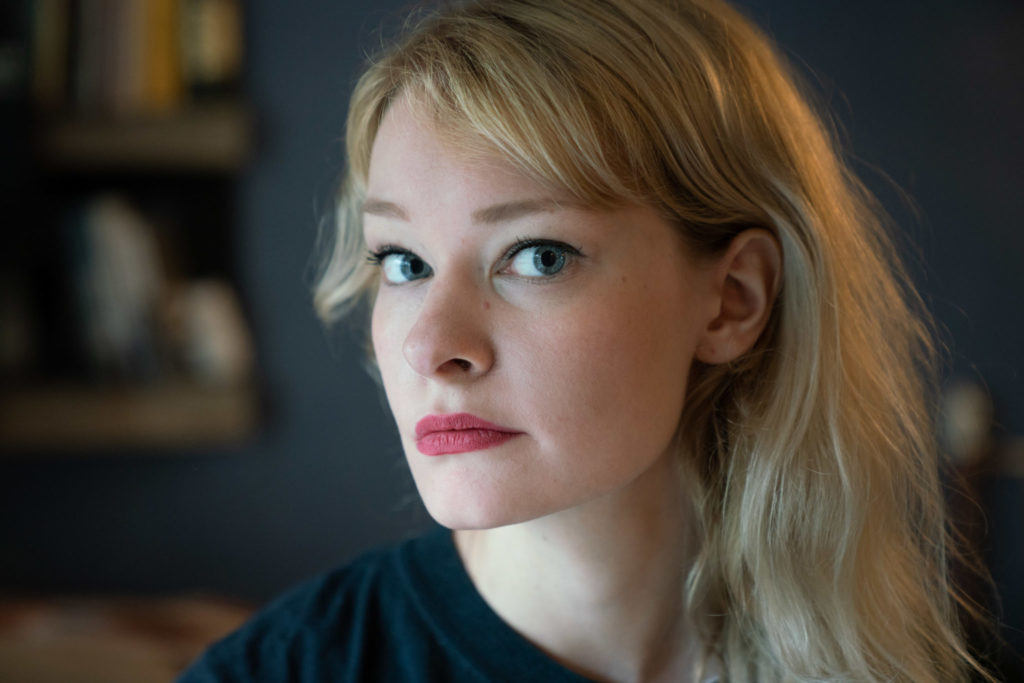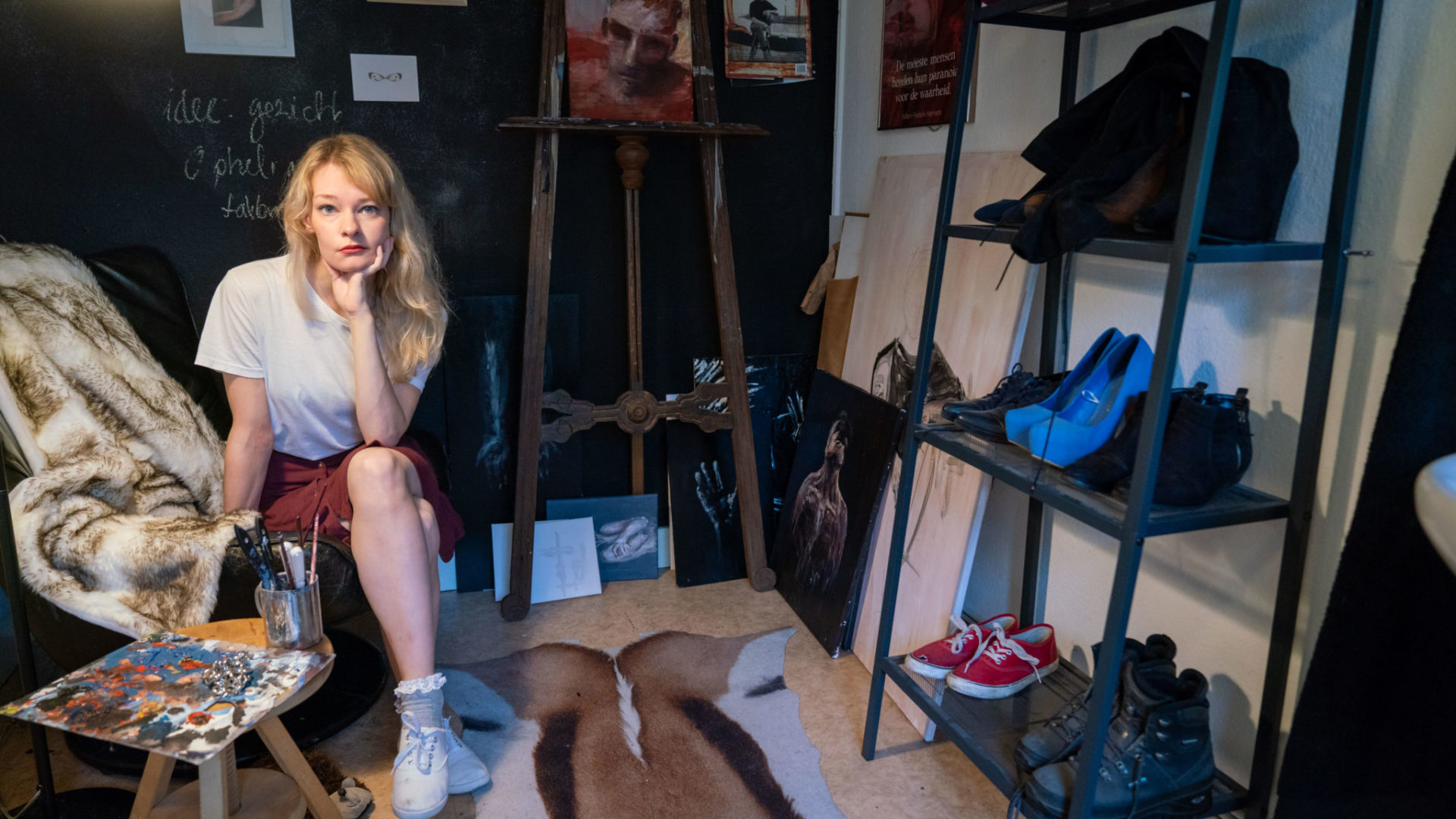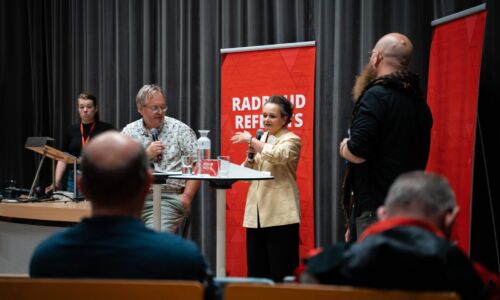Summer interview (2): Charlotte Blaak is an anti-feminist
Charlotte Blaak doesn’t believe in quotas for women and she opposes the use of the word oppression. VOX staff member and feminist Jozien Wijkhuis speaks to the Philosophy student. ‘Why do you wear a T-shirt that says Feminism is Cancer?’
I’m surprised to discover, a few minutes into our conversation, that Charlotte Blaak (21) and I already agree on something, namely that ‘feminism is cool’. But while I see this as a positive development, immerse myself in activist Netflix series and listen to a feminist podcast on my way to Blaak’s student flat in Arnhem, her perspective on this trend is very different. The young Philosophy student happens to be an anti-feminist.
Within a short period of time I’ve encountered Blaak twice in the national media. The first time in a minor role in an article about her boyfriend Jesper Jansen, another anti-feminist, in Volkskrant Magazine, where Charlotte’s hands were shown on the photograph, pulling his suspenders straight. The photograph was accompanied by the revealing headline ‘The angry white man wants his manliness back’ and the article ended with the quote ‘My girlfriend can’t wait to make packed lunches for our children and drive them to football practice.’ She later appeared in the Trollen, Trump en Thierry (Trolls, Trump and Thierry) documentary broadcast by the current affairs programme Tegenlicht.
‘I find it quite logical that a man works more than a woman’
She thought the latter was well made, she says, as she sits with a cup of coffee at the foot of her bed. ‘Even though they cut out a lot, what was left was good.’ She’s less happy with the Volkskrant Magazine article. ‘It’s not really that I won’t be active outside the home’, she says, slightly on her guard. ‘I’d be bored to death. I want to work a few days a week, but mostly I want to make myself useful at home. And I want lots of children.’
In Trollen, Trump en Thierry Blaak smiles into the camera. ‘Lavender Children’ it says at the bottom of the screen, the name of the political meme Facebook group that Blaak manages with others. Lavender, yes, in reference to the potpourri sachet Thierry Baudet is shown smelling with so much delight in an infamous VPRO video. In the documentary, Blaak sits between her also broadly smiling boyfriend Jesper and another friend, Samuel. They talk about left-wing people, ‘linkie-winkies’, and argue that people ‘on the right’ have more material for jokes. ‘I think it’s funny that we were asked to take part in this documentary. Lavender Children doesn’t even have two hundred members. It’s insignificant. But I do have something to say and I want people to hear it.’
The article was about the young white man’s crisis, the documentary about internet trolls, memes and the rise of the right wing. How did you end up appearing in both?
‘The Tegenlicht documentary shows that most people on the right of the political spectrum don’t spend much time thinking about whether they’ve offended someone. I think that’s because as right-wingers we’re not much into victim thinking. There isn’t this idea of a class struggle with the victims, so we drag everyone through the same wringer. That’s the meme aspect. Being critical of feminism is part of it. By the way, where did you see that I call myself an anti-feminist?’
On Facebook. You wrote ‘for an anti-feminist I quite often wear dungarees.’
She laughs: ‘Oh, I might have written that, yeah.’
So you don’t mind me calling you that?
‘No. The term anti-feminist pretty much covers it. It’s just that I wouldn’t call myself that in a conversation because I don’t want to sound like an activist. I find activism irritating.’
And there you are, opposite someone who identifies themselves as an activist feminist. What’s your issue with feminism exactly?
‘For me it’s mostly about class thinking. According to feminists, you have the oppressing class, men, and the oppressed class, women. I don’t agree with this word, ‘oppression’. The feminist perspective is that men are perpetrators, and women are victims. And I don’t think that’s right. I also find this striking in the #metoo discussion. If a woman says ‘this man did such and such to me’, we always believe her. Even though this is not how it’s supposed to be in the legal system. On the other hand, when someone like Jelle Brandt Cortius makes a similar claim, we suddenly take a much more nuanced view, saying that ‘maybe it isn’t true, and surely there’s another side to the story.’ Why wouldn’t this be true of women too? Can a woman not lie about being attacked or raped?
Throughout history you do see a lot of inequality between men and women, but I think there are better ways of explaining it than ‘it was because men wanted to oppress women’.’

How would you explain it then?
‘I’ll give you an example: next year we’re celebrating 100 years of voting rights for women. Big celebration, great, super cool. But back in 2017, nobody celebrated 100 years of voting rights for men.’
General voting rights, you mean. But politics was also dominated by men before then?
‘Yes, but not just because they were men. We’re talking about 1917 and 1919, a time when Europe was full of political tensions and threats of war. Politics was mostly about the question: ‘in which trench would you like to die?’ Since it was mostly men who did the dying in trenches, I think it makes sense that men should be allowed to decide about it. I also think society has fewer issues with using men as cannon fodder than women. As a society, we’re gynocentric.’
In the fourth year of Blaak’s secondary education, a teacher said that it was unfair that men often occupied much higher positions at work than women. This was the first time Blaak found herself rebelling. ‘My first reaction was ‘but if you’re good, then that’s where you’ll end up, no?’ I’d heard the idea that there was ‘an unfairly large number of men at the top’ before, but from that moment on I knew: I feel differently about this than other people. I generally prefer ideas that aren’t very popular. Maybe it’s an adolescent thing, or a question of personality, I don’t know.’
How do you know that your ideas are not so popular?
‘I really enjoy debating for the sake of debating. I just say random things to see what happens, and then people get angry, which is how I test people’s opinions. The idea of the number of men at the top being fair was also something I was just trying out for size. But then I thought: actually, it’s kind of true. So I got stuck there.’
On Facebook, you try out a lot of controversial ideas for size. As you sit here opposite me, I see a moderate woman whom I have no trouble relating to. Beforehand, I wasn’t so sure. On a picture on Facebook, you’re wearing a T-shirt with the text Feminism is Cancer. Why wear a T-shirt like that?
‘I find these kinds of statements interesting because they provoke a reaction. It’s generally meant to be funny, stimulating, and even a bit painful. The responses I get tell me how much value people attach to terms like feminism. I’m kicking against something, so apparently there’s a sacred cow here.’
But you wouldn’t wear the T-shirt if you disagreed with the statement, would you?
‘No, I don’t disagree with it, but I wouldn’t say it in a conversation if I’m trying to get somewhere. This may be the difference between me in real life and me on the Internet. On the Internet I’m not looking for a dialogue, but in real life I am. I want to hear what the other person has to say, where their opinions differ from mine.’
When you write on Facebook ‘a man earns money, a woman creates value. It’s that simple’, how much truth is there in that?
‘That post was based on the idea that a man earns a lot of money, and a woman transforms in into food and a home, and care for the children. I think this is basically true. I find it quite logical that a man works more than a woman. These days you can no longer expect a woman not to work at all, it’s not affordable, and I think women would be incredibly bored. But I don’t find it a strange idea that the man should work more. Women suffer less from working less.’
Why do you think that is?
‘I think it’s due to womb envy. Women can always create, they can give birth to a child. Men have to prove themselves in different ways. That’s why they have more drive to work for society, a business, their family, etc.’
There’s a knock on the door, and boyfriend Jesper walks in. ‘Just checking that you’re not saying anything incriminating about me’, he jokes, ‘because that’s who we are as a couple, aren’t’ we?’ Once Jesper returns to his own room, Blaak explains that recently at Radboud University, a girl threw a beer into his face, for no reason. ‘I thought it was funny how she then hid behind her boyfriend’s back. I rarely get such strong responses in real life. Maybe because I’m a girl.’
‘Men are prepared to go further. Because of their need to prove themselves, their drive.’
She was once listed on a racist wall of shame on the Internet, for sharing a picture of a concentration camp with the caption ‘it didn’t start with camps, but with hate and intolerance.’ ‘I added ‘when you say ‘hate and intolerance’, do you mean Islam-motivated anti-Semitism and homophobia?’ Apparently, this made me a racist. But I was talking about religion, not race. Of course, I’m not happy to appear on a racist wall of shame. Potential employers will see it too.’
When she publishes a strongly anti-feminist post, she sometimes has to get over her own aversion. ‘It’s quite nice to believe that ‘I’m a woman, so I’m a victim, and disadvantaged’. It makes anything you achieve much more valuable. But maybe it’s not true, and it really is down to our own achievements. This puts more pressure on us.’
But according to this theory it would mean that the absence of women at the top, for example of the university, is simply due to women delivering lesser quality.
‘Yes. I often think that’s true.’
Radboud University has all kinds of programmes to help women reach the top. Professor Marieke van den Brink recently said in VOX that this low quota is due to unconscious prejudice. You don’t believe in this?
‘Radboud University states in its selection policy: ‘if we have two candidates of equal value – we will choose the woman’. Because of diversity. But that means it’s not about quality, only about what you’re hiding in your pants. It seems to me to be a strange criterion.’
Just to be clear: you believe that in a group of one hundred men, there are more suitable candidates for a university Chair than in a group of one hundred women?
‘Yes.’
Why?
‘Because I think men are prepared to go further. Because of their need to prove themselves, their drive. Men don’t suffer so much from ninety-hour working weeks, while women are quicker to develop burn-out symptoms. I simply think men are better suited for it. That doesn’t mean that men are by definition more intelligent, or that they work harder, but that men are more likely to have the qualities required for a top position.’
In your opinion, what would the ideal university board look like?
‘I don’t think there’s anything wrong with a predominantly male board, nor do I have a problem with women board members. But I don’t believe in quotas. I think everyone will get the position he or she deserves.’
In other words, women have to ‘work harder’?
‘Yes. Or maybe work differently.’
What do you mean?
‘Women intuitively feel that they work longer days than men, because women have more trouble letting go of ‘the home situation’. There’s more emotional involvement, so it’s not strange if a man and a woman work an equal number of hours at the office, that the woman will tire more easily. Simply because they have a different approach to working hours and work. If you’re a woman who doesn’t have an issue with this, great! I think you’ll easily get the position you want. I don’t think quotas add anything, though. If you believe that women are underrepresented because men have certain prejudices against them, you can never conclude that the system is fair in its present form.’
Nijmegen is known as Havana on the Waal, Radboud University devotes a lot of energy to programmes for supporting women in academia… What’s it like for you studying here?
She laughs: ‘What’s great about left-wing voters is that they have much better bars. They’re more creative and they make more music, so there are lots of great places for going out. I knew Nijmegen was a left-wing university when I enrolled here. It’s just like reading De Telegraaf, you also take into account that it’s a right-wing newspaper. I do notice that left-wing theories are more easily accepted at the University. For example when talking about the wage gap, which doesn’t even exist. But it doesn’t bother me much, certainly not in the Philosophy department. There you can have a good discussion with most people.’





Kezzer teaser schreef op 24 april 2019 om 14:44
Queen=women
Priminister= women
Stephan the camel stealer schreef op 24 april 2019 om 14:49
Absolutely shamazing I’m no longer a feminist